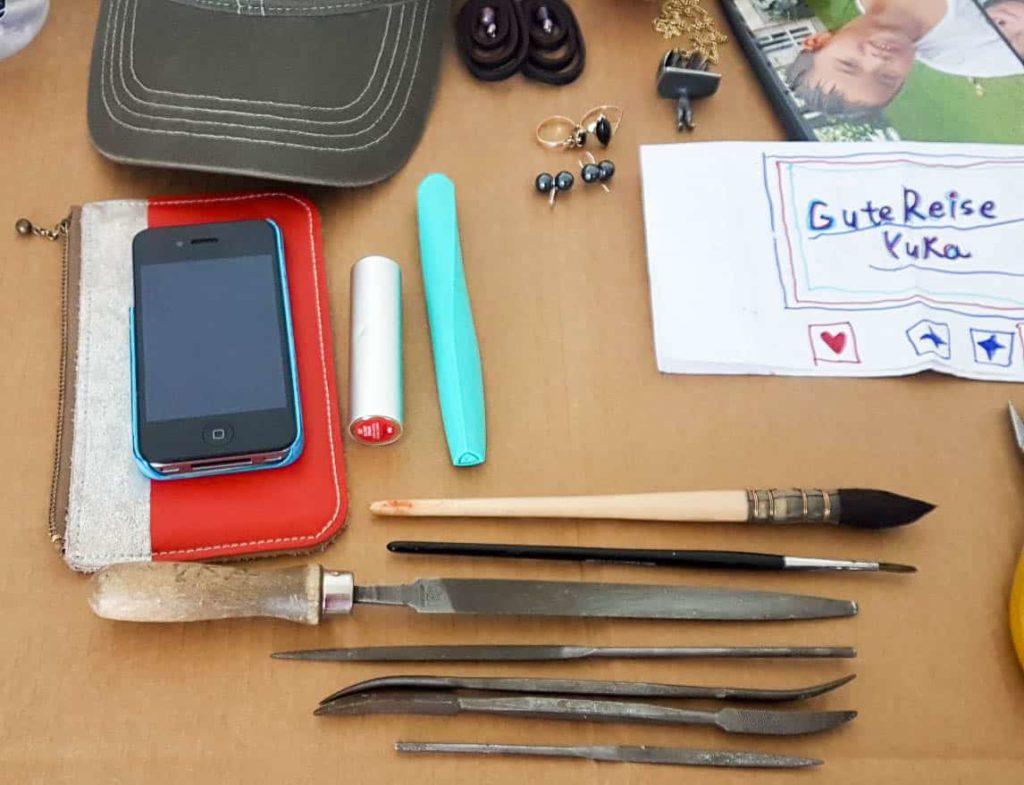
Yuka Oyama is producing a series of work “Helpers – Changing homes” in Wellington as part of a residency at Whiti o Rehua School of Art. This will be displayed at The Language of Things: Meanings and Value in Contemporary Jewellery, Dowse Museum in 24 February – 24 June 2018.
Oyama just recently completed her PhD study The Stubborn Life of Object, which included a series of performances in which important objects become full body costumes. She has extended this in Aotearoa New Zealand for a project about the objects that migrants retain to keep a connection to the previous home. She then constructs a body-sized version of this for a future performance. This follows a similar path to her previous “inner animal” project, which created headpieces based on the creatures with which wearers identified.
Garland was curious to learn more about her project in Aotearoa New Zealand. So we asked Yuka some questions and replied with text and also some WhatsApp videos, that we’ve compiled for you.
✿ How did you research the meaning of objects for Wellingtonians?
I interviewed 20 people for two to four hours long.
✿ Were there any stories that surprised you?
Often very obvious things became apparent. People age group in the early 20s do not have much self-reflection upon issues related to home. Or most of them are very unsure of themselves. Many of them cried. They want to explore the world, go somewhere else, keep on living transient lives.
People in their 30s came with joy saying that they finally found someone else like “real” partners who can anchor them to a specific location, Wellington. They are ready to stop moving around and start buying properties, becoming parents. People in their 40s said that they were starting to define home within themselves, but they were not confident yet to say this officially.
People above 60 said that they have found home within themselves. They brought artworks or some things that they made instead of “objects” that they bought. Levels of personal maturity are often reflected in the concepts of home. Often the talk about “home” turned into talks about “self”.
I kept on asking mihimihi [Māori introductions] from everyone. Most of them pointed out locations where they are from in their mihimihi, though the traditional format of locations that relate to rivers and mountains are places that they do not know and they have never really been to. The sense of language was as fluid as mine, when you are not fully aware which language you are speaking.
How you look has a great impact on the sense of “home”. It was much more dramatic to speak to non-westerner interviewees. I have actually missed Asia. I am not only European.
Through living in Germany, I have forgotten the way I look to others—an Asian woman. I have forgotten about the original feelings of being a stranger, since it has been such a long time since I moved to Germany.
After coming here, I realized that there are many Asian people in Wellington. It feels to me like a strange irony that one becomes aware of the ‘difference’ being an Asian person, because there are many of us.
Through visiting Wellington, I have become aware of the aspect that what makes “home” is not only constituted by human relations, memory and places, but also the society where you understand the rules of the game, and hopefully you are allowed to participate in it.
The current closures of national borders—regardless of our hope not to judge humans according to race, gender, and religious believer—have influenced me to reconsider the notion of home. It is important to have a better awareness of one’s own origin once again in order to widen one’s horizon and accept hybridness.
✿ What will you do with this information?
I am making homes out of cardboard boxes that you can wear and carry around. These homes will be reconstructed in a performance, which will be filmed. The sculptures will also march along the waterfront in Wellington. The public presentation is planned at the Block 1 of Massey University on 18 January 2018, starting at 5.30 pm. Te Whare Pukaka/Block 1 at 5.30pm. The Accompany Helpers: Moving Homes procession continues on foot across Massey University CamusRefreshments in the Tea Gardens, Block 10 level C from 6pm. The filming will take place on Saturday, 20 January or Sunday 21 January at the Civic Square.
✿ Has being in New Zealand opened your eyes in any way?
Yes. It is teaching me the concept of number 9 wire: Just employ things that you have and perform your part—well.
✿ Where next?
I want to keep on exploring extreme transiency and its relation to material culture in different parts of the world.
I want to make a virtual reality archive of transient people using VR technology. In the file, there should be hundreds of sculptures that are worn and move. These sculptures actually come from many countries and cities. Parallel to this, I plan to work much more in the public space. I aim to study techniques employed in masquerades and processions in public space.
Yuka Oyama was born in Tokyo in 1974 and grew up in Malaysia, Japan, Indonesia, USA and Germany.

